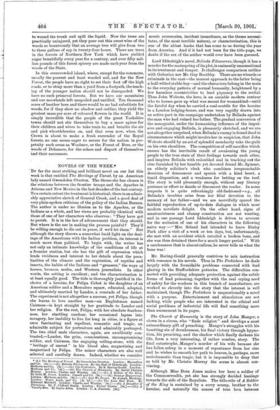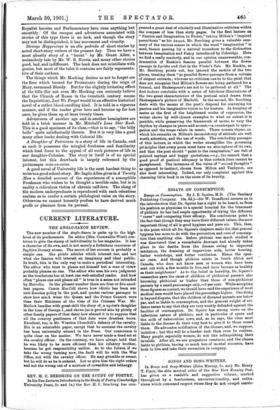NOVELS OF THE WEEK.*
By far the most striking and brilliant novel on our list this week is that entitled The Heritage of Unrest, by an American lady named Gwendolen Overton. The theme she has chosen is the relations between the frontier troops and the Apaches in Arizona and New Mexico in the last decades of the last century. To a certain extent the treatment is historical; there is an admir- ably appreciative sketch of General Crook, and a good deal of very plain-spoken criticism of the policy of the Indian Bureau. The author is under no illusion as to the Apaches, or the Indians as a whole, and her views are probably identical with those of one of her characters who observes : "They have got to perish. It is in the law of advancement that they should. But where is the use in making the process painful ? They'd be willing enough to die out in peace, if we'd let them." But although the story throws a somewhat lurid light on the deal- ings of the Americans with the Indian problem, its interest is much more than political. To begin with, the writer has not only an intimate knowledge of the conditions of life at a frontier station, but she has the gift of expression which lends vividness and interest to her details about the pecu- liarities of the climate and the vegetation, of reptiles and insects, the habits of the Indians and "greasers," the ways of horses, broncos, mules, and Western journalists. In other words, the setting is excellent; and the characterisation is at least equally good. The title is thoroughly justified in the choice of a heroine, for Felipa Cabot is the daughter of an American soldier and a Mescalero squaw, educated, adopted, and ultimately married by Landor, a comrade of her father. The experiment is not altogether a success, yet Felipa, though she learns to love another man—an Englishman named Cairness—is kept straight by her gratitude to Landor and her religion. For the rest, Felipe, with her absolute fearless- ness, her startling candour, her occasional lapses into savagery, her inability to live for long in cities, is a figure at once fascinating and repellent, romantic and tragic, an admirable subject for portraiture and admirably portrayed. The two chief male characters, again, are excellently con- trasted,—Landor, the grim, conscientious, uncompromising soldier, and Cairness, the engaging rolling-stone, with the "heritage of unrest" in his blood also, magnetising and magnetised by Felipe. The minor characters are also well selected and carefully drawn. Indeed, whether we consider • (1.) The Heritage of Unrest. By Gwendolen Overton. London : Macmillan and Co. [6s.]—(2.) Belinda Pitzmarren. By the Earl of Iddesleigh. London: Methuen and Co. (64.]—(3.) The Frobishers. By S. Baring-Gould. 'London : Methuen and Co. [6a.]—(4.) The Church of Humanity. By David Christie Murray. London : L'hatto and Windus. [6s.r(5.) A Soldier of the King. By Dora M. Jones. London: Cassell and Co. 66.]—(6.) Strange Happenings. London: Methuen and Co. Ps.]-147.) Lost e Forget. By Joseph Hocking. London : Ward, Lock. and Co. . The Lone Star Rush. By Edmund MilchelL . London : Cha and Winch's. - [6s]—(9.) A Daughter of Patricians. By F. Clifford Smith. London : Fisher lTnwin. [68.]----(10.) A Varsity Man. By Inglis Allen. London: C. A. Pearson. Pa.]
scenic accessories, incident (sometimes, as the theme necessi- tates, of the most terrible nature), or characterisation, this is one• of the ablest books that has come to us during the year from America. And if it had not been for the title-page, we doubt if the sex of the author would ever have been guessed.
Lord Iddesleigh's novel, Belinda Fitzwarren, though if has a murder for the mainspring of its plot, is eminently unsensational in its treatment and temper. It challenges comparison neither with G-a,boriau nor Mr. Guy Boothby. There are no wizards or criminals in the cast—the nearest approach to the latter being a half-witted stable-boy—and the characters belong in the main to the everyday pattern of normal humanity, heightened by a few harmless eccentricities to lend piquancy to the recital. Thus John Wolcote, the hero, is an amiable modern centaur who to horses gave up what was meant for womankind—until the fateful day when he carried a coal-scuttle for the heroine in a London lodging-house, and was very rapidly drawn into an active part in the campaign undertaken by Belinda against the man who had ruined her father. The gradual conversion of the misogynist, under the humanising influence of the impul- sive and engaging Belinda, is pleasantly sketched, and we are not altogether surprised, when Belinda's enemy is found dead in circumstances which might involve her in suspicion, that John Wolcote should by an act of splendid mendacity take the guilt on his own shoulders. The competition of self-sacrifice which ensues has the inevitable result of awakening the young people to the true state of their feelings towards each other, and inspires Belinda with redoubled zeal in tracking out the clue furnished by her humble yet devoted friend Mr. Spinner, an elderly solicitor's 'clerk who combines irreproachable decorum of demeanour and speech with a kind heart, a timid disposition, and a weakness for betting on the turf. The story is told pleasantly enough, without any literary pretence or effort to dazzle or disconcert the reader. In some respects it is quite refreshingly old-fashioned--e.g., all Belinda's troubles arise from her filial devotion to the memory of her father—and we are mercifully spared the faithful reproduction of up-to-date dialogue in which most modern novelists delight. On the other hand, signs of amateurishness and clumsy construction are not wanting, and in one passage Lord Iddesleigh is driven to account for the seclusion of one of his characters in the following naive way Mrs. Seland. had intended to leave Binley Park after a visit of a week or ten days, but, unfortunately, she met with an accident which entailed a broken bone, and she was thus.detained there for a much longer period." With a carelessness that is almost callous, he never tells us what the bone was
Mr. Baring-Gould generally contrives to mix instruction with romance in his novels. Thus in The Frobishers he deals largely with the formidable problems connected with lead glazing in the Staffordshire potteries. The difficulties con- nected with providing adequate protection against the subtle forms of lead poisoning, together with the real crying need of safety for the workers in this branch of manufacture, are worked so cleverly into the story that the interest is well maintained, though The Frobishers is unquestionably a novel with a purpose. Entertainment and stimulation are not lacking, while people who are interested in the ethical and social problems of industrial life will find something more than amusement in its pages.
The Church of Humanity is the story of John _Manger, a clown in a circus, who "finds religion" and develops a most extraordinary gift of preaching. Manger's struggles with his besetting sin of drunkenness, his final victory through hypno- tism, his preaching,- and the shadow which finally darkens his life, form a very interesting, if rather sombre, story. The final catastrophe, Manger's murder of his wife because she has fallen asleep in a moment of repentance from her sins and he wishes to smooth her path to heaven, is, perhaps, more melodramatic than tragic, but it is impossible to deny that as told by Mr. Christie Murray the scene is almost con- vincing.
Although Miss Dora Jones makes her hero a soldier of the Commonwealth, yet she has strongly decided leanings towards the side of the Royalists. The title-role of A Soldier of the King is sustained -by a sorry scamp, brother to the heroine, and naturally the course of true love between
Royalist heroine and Parliamentary hero runs anything but smoothly. Of the escapes and adventures associated with stories of this type there is no lack, and though the story may not be distinguished, it has movement and vivacity.
Strange Happenings is an olla podrida of short stories by noted short-story writers of the present day. Thus we have a most ghastly story of a " haunt " by Mr. Grant Allen; a melancholy tale by Mr. W. E. Norris, and many other stories good, bad, and indifferent. The book does not scintillate with genius, but most of the tales it contains are fairly representa- tive of their authors.
• The things which Mr. Hocking desires us not to forget are the fires which burned for Protestants during the reign of Mary, surnamed Bloody. But for the slightly irritating effect of the title (for not even Mr. Hocking can seriously believe that the Church of Rome in the twentieth century means the Inquisition), Lest We Forget would be an effective historical novel of a rather blood-curdling kind. It is told, in a vigorous manner, and if the reader gives hero and heroine up for lost once, he gives them up at least twenty times.
Adventures of another age and in another hemisphere are told in a brisk manner in Mr. Mitchell's Lone Star Rush. This is a good specimen of its class,—that is to say, "the billy boils" quite satisfactorily therein. But it is very like a good many other books dealing with Colonial life.
A Daughter of Patricians is a story of life in Canada, and as such it possesses the mingled freshness and familiarity which lend force to the appeal of all such pictures of life in our daughter-Colonies. The story in itself is of no special interest, but this drawback is largely redeemed by the picturesque mise-en-scene.
A good novel of University life is the next hardest thing to write to a good school-story. Mr. Inglis Allen gives in A Varsity Masa a detailed account of the experiences of a susceptible Freshman who wishes to be thought a terrible rake, but is in reality a ridiculous victim of chronic calf-love. The slang of the modern undergraduate is reproduced with such relentless realism as to confer a certain philological value on the story. Otherwise we cannot honestly profess to have derived much profit or pleasure from its perusal.







































 Previous page
Previous page